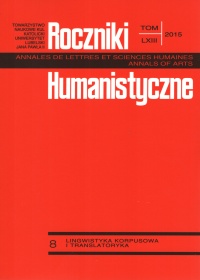Peuples constitutifs et identités linguistiques en Bosnie-Herzégovine
Abstrakt
Narody stanowiące Bośnię-Hercegowinę a ich tożsamość językowa
W 1918 roku Antoine Meillet, francuski językoznawca i wybitny znawca świata słowiańskiego, pisał : „Świat dąży do tego, by mieć jedną tylko cywilizację, ale języki cywilizacyjne w nim się pomnażają” (A. Meillet, Les langues dans l’Europe nouvelle, Paris, Payot, 1918, p. 2). Prawie sto lat później przestrzeń, dla której tradycje polityczne zastrzegają nazwę Europa Centralna, potwierdza zasadność wizji wyżej wspomnianego językoznawcy, choćby tylko dla pomnożenia nazw języków z tego regionu geograficznego i kulturowego. W tej części Starego Kontynentu zamieszkują głównie wspólnoty o tradycjach i językach słowiańskich. Każdy, kto pojął historię narodów południowych Słowian, będzie umiał połączyć nazwę serbsko-chorwacki / chorwacko-serbski z nazwą Jugosławia. Ta ostatnia nie implikuje etnonimu jugosłowiański w tym znaczeniu, w jakim etnonim francuski – a Francja uznawana jest za Państwo-naród – odsyła do narodu francuskiego. Rygorystyczne rozróżnienie, jakiego dokonują z tytułu dziedzictwa austro-węgierskiego narody zamieszkujące Półwysep Bałkański między nacionalnost (‘narodowość’, ‘przynależność do narodu’, niem. Volksangehörigkeit) et državljanstvo (‘citoyenneté’, ‘appartenance à un État’», niem. Staatsangehörigkeit), zderza się z koncepcją francuską (zachodnią), w której naród i państwo tworzą, grosso modo, spójne kryterium odniesienia. Różnorodne zmiany polityki językowej jak i wspólnoty społeczne czy wyznaniowe, które tworzą obecną Bośnię-Hercegowinę, ów dziwny przeżytek „mozaiki narodów i tradycji”, jaką tworzyła swego czasu Jugosławia (1945-1992), czynią złożonymi relacje zarówno instytucjonalne, jak i ludzkie między narodami stanowiącymi to państwo.
Artykuł podejmuje problem konieczności przemyślenia na nowo pojęcia języka (narodowego, urzędowego, używanego), narodu i konstytucji państwowej, badając szczególne przypadki, jakie tworzy koabitacja Bośni i Hercegowiny. Nazwy narzucone przez porozumienia w Dayton (1995) i odnoszące się zarówno do bytów politycznych, jak i do narodów oraz mniejszości, takie jak Fédération croato-bosniaque / croato-musulmane, Republika Srpska (serbski byt polityczny Bośni i Hercegowiny), Croates / Bosno-Croates, Serbes / Bosno-Serbes, Bosniens, Bosniaques / Musulmans, Bosniaques-Musulmans, etc., tworzą szeroką domenę, w której przeplatają się i nakładają się na siebie rewindykacje językowe i rzeczywistości wieloetniczne / wielowyznaniowe.
Bibliografia
Anić Vladimir, 1998, Jezik i sloboda, Zagreb, Matica Hrvatska.
Banac Ivo, 1990, Main trends in the Croatian Language Question, Zagreb, Most / The Bridge.
Bajrić Samir, 2006, « Quelle(s) langue(s) parlons-nous ? : transfert de concepts et de terminologies », Revue Syntaxe et Sémantique, Caen, Presses Universitaires de Caen, p. 107-123.
Bajrić Samir, 2009, « Dénominations de l’étranger », dans Didactique des langues : domaines et dénominations (textes réunis par M. Dat), Dijon, ABELL, p. 13-37/
Bajrić Samir, 2015 : « Vie et mort d’une (dénomination de) langue : le cas du ‘serbo-croate’ » dans Actes du colloque Disparitions : contributions à l’étude du changement linguistique, Université de Bourgogne, 17-18 juin 2011, Honoré Champion, p. 205-220.
Bajrić Samir et Saulan Dubravka, « Le croate et le serbe entre deux terminologies militaires », Diachroniques, numéro 4 (La langue à l’épreuve de la guerre), Paris, Presses Universitaires de Paris-Sorbonne, à paraître janvier-février 2016.
Balić Smail, 1973, Kultura Bošnjaka. Muslimanska komponenta, Vienne, Holzhausen.
Balić Smail, 1992, Das unbekannte Bosnien. Europas Brücke zur islamischen Welt, Köln, Weimar, Wien, Böhlau Verlag.
Begić Midhat, 1994, La Bosnie. Carrefour d’identités culturelles, Paris, l’Esprit des Péninsules.
Brodnjak Vladimir, 1992, Razlikovni rječnik srpskog i hrvatskog jezika, Zagreb, Školske novine.
Castellan Georges et Vidan Gabrijela, 1998, La Croatie, Paris, PUF, Que sais-je.
Caussat Pierre, Adamski Dariusz, Crépon Marc, 1996, La langue source de la nation : Messianismes séculiers en Europe centrale et orientale du XVIIIe au XXe siècle, Liège, Mardaga.
Ćirilov Jovan, 1989, Hrvatsko-srpski rječnik inačica ; Srpsko-hrvatski rečnik varijanti, Beograd, Stilos.
Dabo-Denegri Ljuba, 2007, Hrvatsko-francuski jezični dodiri, Zagreb, Globus.
Garde Paul, 1992, Vie et mort de la Yougoslavie, Paris, Fayard.
Garde Paul, 1995, Journal de voyage en Bosnie-Herzégovine, Paris, Odile Jacob.
Hagège Claude, 1992, Le souffle de la langue, Paris, Odile Jacob.
Heger Henrik, 1998, Les pays croates du VIIe au XIIe siècle, dans Mélanges offerts à Philippe Ménard, Parsi, Honoré Champion, Tome i, p. 629-666.
Ivić Pavle, 1990, « Jedinstvo i razjedinjenost srpskohrvatskog književnog jezika – aktuelni trenutak », dans Ivić, P., P.Q., O jeziku nekadašnjem i sadašnjem, Beograd, BIGZ-Jedinstvo.
Ivić Pavle, 1990, « Srednjovekovne srpske povelje kao dokumenti o jeziku i kulturi », dans Ivić, P.P.Q., O jeziku nekadašnjem i sadašnjem, Beograd, BIGZ-Jedinstvo.
Kačić Miro, 2000, Le croate et le serbe : illusions et falsifications, Paris, Honoré Champion, traduit par Bajrić Samir.
Kepel Gilles, 2000, Jihad. Expansion et déclin de l’islamisme, Paris, Gallimard.
Lisac Josip, 1996, Hrvatski dijalekti i jezična povijest, Zagreb, Matica Hrvatska.
Matasović Ranko, 2011, Jezična raznolikost svijeta : podrijetlo, razvitak, izgledi, Zagreb, Algoritam
Meillet Antoine, 1918, Les langues dans l’Europe nouvelle, Paris, Payot.
Mirošević Franko, Šanjek Franjo, 1995, Hrvatska i svijet od V. do XVIII. Stoljeća, Zagreb, Školska knjiga.
Mudry Thierry, 1999, Histoire de la Bosnie-Herzégovine : faits et controverses, Paris, Ellipses.
Pranjković Ivo, 1993, Kronika hrvatskoga jezikoslovlja, Zagreb, Matica hrvatska.
Ramet P. Sabrina, Clewing Konrad, Lukić Reneo, 2008, Croatia since Independence: war, politics, society, foreign relations, München, R. Oldenbourg Verlag.
Schnapper Dominique, 1994, La communauté des citoyens : sur l’idée moderne de nation, Paris, Gallimard.
Škarić Ivo, 2001, « Razlikovna prozodija », dans Jezik, Zagreb, Hrvatsko filološko društvo, numéro 1, p. 11-19.
Thomas Paul-Louis, 1999, Frontières linguistiques, frontières politiques, dans Histoire, Epistémologie, Langage, Paris, p. 63-82.
Weil Patrick, 2002, Qu’est-ce qu’un Français ? Histoire de la nationalité française depuis la révolution, Paris, Grasset.
Copyright (c) 2015 Roczniki Humanistyczne

Utwór dostępny jest na licencji Creative Commons Uznanie autorstwa – Użycie niekomercyjne – Bez utworów zależnych 4.0 Międzynarodowe.





